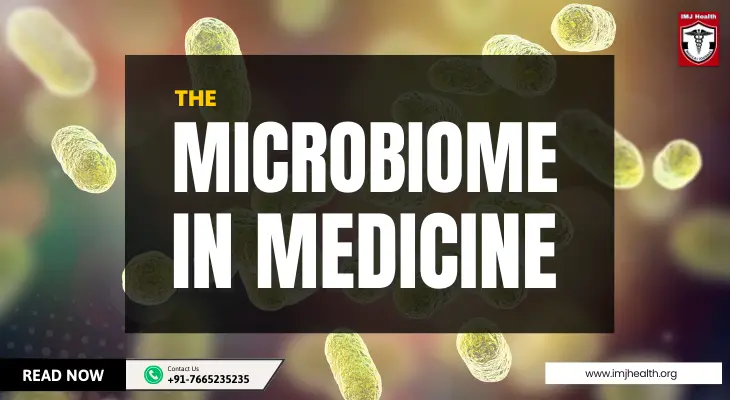The Microbiome in Medicine: Breaking New Ground for Human Health

The gut microbiome plays a vital role in digestion, immunity, and even mood regulation. This blog answers common questions about probiotics, prebiotics, microbiome testing, diet, and treatments like fecal transplants. Learn how to support a healthy gut naturally and understand the science-backed ways to improve overall well-being.
The human body is home to trillions of microbes—tiny organisms that profoundly influence our health. Once overlooked, these microbial communities are now recognized as key players in digestion, immunity, mental wellbeing, and even disease prevention. Among them, the gut microbiome has emerged as the most studied and impactful, often referred to as a “second brain” due to its influence on multiple systems. From shaping immune responses to regulating mood, the microbiome is redefining modern medicine. For more on the latest advancements, read our article on Advancements in Microbiome Research: The Future of Medicine.
What Is a Microbiome?:
A microbiome is a community of microorganisms—including bacteria, fungi, viruses, and archaea—that live in specific habitats such as the skin, mouth, respiratory tract, and gut. Though microscopic, they have a crucial role in maintaining health. Microbiomes exist across all ecosystems, but this blog focuses on the human microbiome and its role in medicine.
What Is the Human Microbiome?:
The human microbiome is the collective genetic material of all microorganisms living in and on our body. Many of these microbes are essential for survival, aiding in digestion, producing vitamins, educating the immune system, and protecting against harmful pathogens.
Major Types of Human Microbiomes:
1. Gut Microbiome: The Second Brain:
The gut microbiome hosts more than 100 trillion microbes, containing genetic material far greater than the human genome. It plays a vital role in digestion, metabolism, and immunity, and produces essential vitamins such as folate and B12.
- Health impact: Imbalances are linked to Crohn’s disease, ulcerative colitis, obesity, Type 2 diabetes, autism spectrum disorders, and more. Learn about other Top Public Health Challenges.
- Therapies: Treatments include probiotics, prebiotics, targeted nutrition, and fecal microbiota transplantation (FMT).
- Gut-brain axis: The microbiome communicates with the central nervous system, influencing mood, cognition, and stress responses through neurotransmitters such as GABA and serotonin. Explore how Neuroscience and Brain Health Research is connected.
2. Oral Microbiome:
Home to over 700 microbial species, the oral microbiome influences not only dental health but also systemic diseases.
- Associated conditions: Periodontitis, dental caries, cardiovascular disease, diabetes, preterm birth, and even Alzheimer’s disease.
3. Skin Microbiome:
Composed of bacteria (e.g., Staphylococcus, Cutibacterium), fungi (Malassezia), and viruses, the skin microbiome varies across body regions.
- Imbalance outcomes: Acne, eczema, and psoriasis.
4. Respiratory Microbiome:
Microbes in the respiratory tract are linked to conditions such as asthma, chronic sinusitis, and COPD.
- They can influence post-viral complications, including secondary infections after COVID-19. Discover the global response to viral threats in our article on H5 Bird Flu: Understanding the Threat and Global Response.
5. Urogenital Microbiome:
The vaginal microbiome is typically dominated by Lactobacillus, which maintains an acidic pH and protects against infections.
- Imbalances can cause bacterial vaginosis, preterm labor, and sexually transmitted infections (STIs).
- In men, urogenital microbiome shifts are linked to infertility and prostatitis.
Microbiome Imbalance (Dysbiosis):
When the microbiome becomes imbalanced, a condition called dysbiosis, it can trigger a wide range of health issues:
- Chronic diseases: Inflammatory bowel disease, Type 2 diabetes, obesity, cancer. The rise of such conditions is also explored in The Effect of Environmental Pollution on Public Health.
- Immune disorders: Multiple sclerosis, rheumatoid arthritis, allergies.
- Neurological conditions: Depression, anxiety, autism spectrum disorders, Alzheimer’s, and Parkinson’s disease.
Treatments for Dysbiosis:
- Lifestyle & diet changes: Increasing dietary fiber, fermented foods, and nutrient-rich meals. The Role of Nutrition in Preventing Chronic Diseases is a key area of research.
- Probiotics & prebiotics: Restoring healthy bacterial balance.
- FMT (Fecal Microbiota Transplantation): Effective for recurrent C. difficile infections and under study for obesity and psychiatric disorders.
- Targeted therapies: Personalized probiotics and microbial nutrition plans are emerging as next-gen solutions. This is part of a broader trend in Innovations in Clinical Research.
The Microbiome and the Immune System:
Nearly 80% of immune cells reside in the gut microbiome, making it a critical player in immunity. The microbiome trains immune cells to distinguish between harmful and harmless microbes, while microbial byproducts such as short-chain fatty acids help regulate inflammation and maintain the gut barrier. For a deep dive into a specific immune-related field, see The Challenges and Opportunities in Immunotherapy Research.
Diagnostic and Therapeutic Applications:
The microbiome is increasingly integrated into medical practice through:
- FMT: Used in clinical treatment and research.
- Personalized probiotics: Tailored therapies for individuals.
- Microbiome sequencing: Mapping microbial DNA to predict and track chronic illnesses. This relies on advanced tools; learn about the importance of proper indexing in The Importance of Scopus Indexing for Medical and Health Research.
Lifestyle, Diet, and Medication Impacts:
- Positive influences: High-fiber diets, whole grains, vegetables, fruits, and fermented foods (yogurt, kefir) increase microbial diversity.
- Negative influences: Processed foods, high saturated fats, and unnecessary antibiotic use decrease diversity and promote dysbiosis. The problem of Antibiotic Resistance and New Treatment Approaches is a critical related issue.
Research Methods in Microbiome Science:
- 16S rRNA sequencing: Identifies microbial species.
- Metagenomics: Studies the entire genetic material of microbial communities.
- Metabolomics: Analyzes microbial metabolites like SCFAs and bile acids.
- Germ-free animal models: Used to establish causal links between microbes and disease.
Future of Microbiome-Based Medicine:
The future of microbiome research lies in precision medicine, but challenges remain:
- Correlation vs causation: Many findings are associative, not proven causal links.
- Microbial diversity: What is “healthy” differs across individuals and populations.
- Standardization: Clinical applications need consistent global protocols.
Despite these hurdles, research is advancing rapidly in:
- Microbiome-driven cancer immunotherapy.
- Next-generation probiotics.
- Maternal and infant microbiome health.
- Personalized treatments based on microbial profiles. This aligns with The Future of Medicine: Top 10 Trending Research Areas.
The microbiome is no longer just a supporting factor in health—it is a central player. With its influence on digestion, immunity, and mental wellbeing, it is reshaping how medicine views prevention and treatment. As research continues, microbiome-based therapies and personalized medicine will pave the way for a healthier future, where maintaining microbial balance is key to lifelong health.
Frequently Asked Questions::
Q. 1: Is it possible to test gut microbiomes at home?
Ans: Yes, at-home gut microbiome test kits are available. However, their results are mostly for general wellness insights and are not considered clinically actionable in medical practice.
Q. 2: Do probiotics actually work?
Ans: Yes, but their effectiveness depends on the strain and the condition being treated. Science-backed strains like Lactobacillus and Bifidobacterium have shown benefits, but most over-the-counter products are not personalized for individual needs.
Q. 3: What is the difference between probiotics and prebiotics?
Ans: Probiotics are live, beneficial bacteria that support gut health, while prebiotics are fibers that act as food for probiotics, helping them thrive.
Q. 4: Can gut health affect my mood?
Ans: Yes. Gut bacteria produce neurotransmitters such as serotonin and regulate inflammation, both of which can influence brain activity and mood. This connection is a key area of study in Neuroscience and Brain Health Research.
Q. 5: Is fecal transplant safe?
Ans: Fecal microbiota transplant (FMT) is generally safe when performed under medical supervision. It is FDA-approved specifically for treating recurrent Clostridium difficile infections.
Q. 6: How long does it take to improve gut health?
Ans: It can take a few weeks to months, depending on diet, lifestyle, and medical conditions. Consistency with dietary changes and probiotic use is key.
Q. 7: Can antibiotics damage gut microbiota?
Ans: Yes. Antibiotics often kill both harmful and beneficial bacteria, which can disrupt gut balance. Probiotics and fiber-rich foods may help restore it. This is a major driver of Antibiotic Resistance, a significant global health challenge.
Q. 8: What foods naturally improve gut health?
Ans: Fermented foods like yogurt, kefir, kimchi, and sauerkraut, along with high-fiber foods such as fruits, vegetables, and whole grains, support a healthy gut.
Q. 9: Is gut health linked to immunity?
Ans: Absolutely. About 70% of the immune system resides in the gut. A balanced microbiome helps protect against infections and supports overall immunity. For the latest on how we protect ourselves, read about The Future of Vaccines: What’s Next in Immunization?
Q. 10: Can poor gut health cause skin problems?
Ans: Yes. Gut imbalances are linked to conditions such as acne, eczema, and psoriasis through inflammation and immune responses.
Explore More in Medical Research:
Delve deeper into the interconnected world of medical science with these related articles:
- Role of Nutrition in Preventing Chronic Diseases – How diet shapes long-term health.
- The Role of Artificial Intelligence in Medical Research – How AI is accelerating discoveries in fields like microbiome science.
- Innovations in Clinical Research: From Medicines to Surgical Methods – New frontiers in treatment methodologies.
- Top 10 Medical Research Topics for Thesis – Inspiration for your next research project.
- 3D Printing in Medicine: A Revolution in Healthcare – Another technological advancement changing patient care.
Contact Medical Journal: IMJ Health:
- Website: www.imjhealth.org
- Editor-in-Chief: Dr. Kusum Lata Gaur | MBBS, MD(PSM), CIC (IGNOU), PGCHFWM
(NIHFW) (WHO Fellow IEC)
Professor, PSM & Member of Research Review Board | SMS Medical College, Jaipur (Rajasthan) India - Editor-in-Chief Email ID: info@imjhealth.org
- General Support Email: info.imjh@gmail.com
- Contact us on WhatsApp: Chat Now : +91-7665235235
If you are working on drug discovery, clinical trials, or pharmaceutical technology, consider submitting your research to IMJ Health to reach a wider audience and make an impact in the field of medicine.

 October 2025 Articles
October 2025 Articles Submit Article
Publication Fee
Research Areas
Guidelines for Authors
Process of
Publication
Journal Importance
Journal Indexing
Journal Polices
Digital
Identification Number
FAQs
Submit Article
Publication Fee
Research Areas
Guidelines for Authors
Process of
Publication
Journal Importance
Journal Indexing
Journal Polices
Digital
Identification Number
FAQs
| Citation Indices | All | Since 2019 |
| Citation | 280 | 209 |
| h-index | 7 | 7 |
| i10-index | 3 | 1 |
| Acceptance Rate (By Year) | |
| Year | Percentage |
| 2024 | 8.17% |
| 2023 | 10.84% |
| 2022 | 9.14% |
| 2021 | 11.26% |
| 2020 | 11.8% |
| 2019 | 10.3% |
| 2018 | 8.65% |
| 2017 | 12.9% |
| 2016 | 10.9% |
| 2015 | 12.5% |
